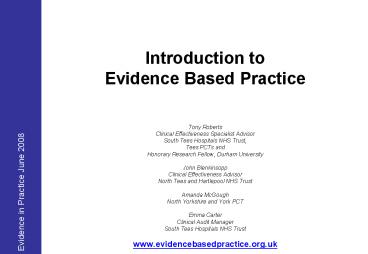Introduction to Evidence Based Practice - PowerPoint PPT Presentation
1 / 14
Title:
Introduction to Evidence Based Practice
Description:
Tony Roberts. Clinical Effectiveness Specialist Advisor. South Tees Hospitals NHS Trust, ... Trust. Amanda McGough. North Yorkshire and York PCT. Emma Carter ... – PowerPoint PPT presentation
Number of Views:96
Avg rating:3.0/5.0
Title: Introduction to Evidence Based Practice
1
Introduction toEvidence Based Practice
- Tony Roberts
- Clinical Effectiveness Specialist Advisor
- South Tees Hospitals NHS Trust,
- Tees PCTs and
- Honorary Research Fellow, Durham University
- John Blenkinsopp
- Clinical Effectiveness Advisor
- North Tees and Hartlepool NHS Trust
- Amanda McGough
- North Yorkshire and York PCT
- Emma Carter
- Clinical Audit Manager
- South Tees Hospitals NHS Trust
- www.evidencebasedpractice.org.uk
2
EBP is part of Clinical Effectiveness
- Clinical Effectiveness is doing the right thing
and the thing right - Evidence based Practice Basically, using the
published systematic research base to specify how
specific groups of patients should be managed
(which diagnostic procedures and treatments
should be used) and to predict outcomes achieved
in terms of patient mortality, morbidity and
quality of life - Implementing change to ensure services deliver
up-to-date treatments in an efficient manner with
the resources to support them (PbR etc) - Routine monitoring of data (activity and
outcome), clinical audit, risk management
(incidents, complaints), infection control and
patient experience to determine whether patients
receive the benefits predicted by the
evidence-base and to ensure efficient deployment
of resources
3
Why do we need EBP?
- Patients - the best individualised care
- Staying up-to-date
- Knowing when to implement change in routine
practice - Working together to develop services
- Planning for change
4
Integrating the evidence
The patients values and preferences
The best clinical decision
The clinicians expertise
The best available evidence from systematic
research
5
Evidence-Based PracticeImplementing research
findings in practice
6
Evidence Based Practice
- Evidence-based Medicine practice is the
conscientious, explicit and judicious use of
current best evidence in making decisions about
the care of individual patients. The practice of
evidence-based health care means integrating
individual clinical expertise with the best
available external clinical evidence from
systematic research - Sackett DL, Rosenberg WMC, Gray JAM, Haynes RB,
Richardson WS. Evidence based medicine what it
is and what it isnt. BMJ 199631271-2.
7
Clinical Governance
- A framework through which NHS organisations are
accountable for continuously improving the
quality of their services and safeguarding high
standards of care by creating an environment in
which excellence in clinical care will flourish.
8
Clinical Governance
The new NHS says A quality organisation will
ensure that evidence based practice is in
day-to-day use with the infrastructure to support
it
9
Infrastructure for EBP
- Information access
- NHS Library, NICE, Medline, CINAHL, Clinical
Evidence, Cochrane Library, Specialist Libraries - Internet
- EBP (esp. Critical Appraisal) skills training, EB
Journal Clubs, multi-disciplinary opportunities
for these - Methods for disseminating summaries of evidence,
NICE guidelines, pathways, care bundles etc - Methods for monitoring the process and outcomes
of care
10
(No Transcript)
11
Using robust, clinically led, measurement to
improve care
12
Getting the predicted improvement in outcome
13
(No Transcript)
14
SummaryEBP for life long learning
- We cant teach you the whole of EBP in two and a
half days, but we hope to inspire you to want to
learn more and to point you in the right
direction - It is important to put personal study time into
following up what you learn on this course, each
session assumes youve not really prepared! - The benefits for patients are clear, but it also
makes your working life more satisfying and
enjoyable - The best way to learn is to have fun, so relax
and enjoy the course. Thanks for making the
effort to come.






























![[PDF] Introduction to Critical Care Nursing 8th Edition Free PowerPoint PPT Presentation](https://s3.amazonaws.com/images.powershow.com/10079332.th0.jpg?_=20240716074)
